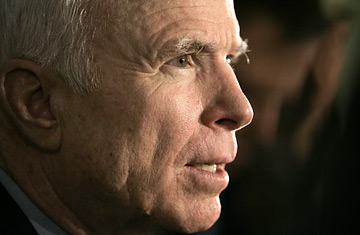
Republican candidate for President John McCain
(2 of 4)
So obviously your operation changed a lot, first phase to second phase. What were the good things about the second phase?
I think I'm better with a leaner kind of campaign. Less bureaucracy, more quick to react. Close friends. I always enjoy when we all sit down together, and [say] like, "what are we to do?" And everybody talks, and everybody argues. Somebody gets mad, and then we all come to an agreement of what we oughta do. I enjoy that a lot. It helps me enormously to help to think things through. To have people that are basically my peers. I mean, they're not my subordinates. They're either working for free or I've known them for many, many years. They're not a group of subordinates who are telling me what they think I want to hear.
Do you think there's something about having your consultants be advisors who are working for free that makes it a better relationship?
Sort of. But it's also people that I've known for 15, 20, 25 years. Whether I was paying them or not, I'm confident that they would be very frank and forthcoming.
Now when are you going to start paying them?
I don't know. I have to find out about that. Maybe after the first 20 million comes in.
We talked a lot about this on the bus but maybe you've now had a few hours to reflect on it. Everyone's talking about how this is a change election. What do you think that the people who have won these first two contests, what do they have in common that's appealing to people?
I think, principle and persuasion won over money. And political messaging. I just think it's clear in both cases. As we joke about it, I've had spirited exchanges at town hall meetings. And as you know, one of those guys that has had a spirited exchange [with McCain] showed up at the rally... and said "We're still not voting for you. I'm not going to vote for you. But I came to say [I respect you]."
When did things start to change for you?
I really do think that when... I came back from Iraq ... and then we hit the debate in New Hampshire right after Labor Day and...
I was on the no surrender tour and there was literally an echo in the room [during a town hall meeting]. I mean, it was a very moving event because you had those two brothers there. I think they were both Marines. And I know you seemed very touched by their service. But there was maybe just 50? 75? 100 people? And of course you had an event at the exact same location on Saturday and it was packed. It was overflowing.
I also think that coincided with people [starting] to pay close attention to the candidates. We were immersed in it. People don't focus until they think the event is coming up. And also [McCain's Iraq war stance] wasn't very popular at that time, as you also know.
How do you feel about the role the war has played in your candidacy?
I think that with the Republican voters that it has helped. My role in the surge and the success it has achieved, it has helped me make my argument that I have the judgment that none of the others do.
